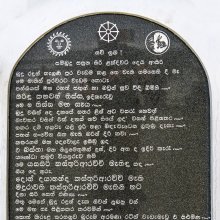Vasara, Vāsara, Vashara: 20 definitions
Introduction:
Vasara means something in Buddhism, Pali, Hinduism, Sanskrit, Marathi, Jainism, Prakrit, Hindi. If you want to know the exact meaning, history, etymology or English translation of this term then check out the descriptions on this page. Add your comment or reference to a book if you want to contribute to this summary article.
Images (photo gallery)
In Hinduism
Yoga (school of philosophy)
Source: ORA: Amanaska (king of all yogas): A Critical Edition and Annotated Translation by Jason BirchVāsara (वासर) refers to a “day”, according to the Amanaska Yoga treatise dealing with meditation, absorption, yogic powers and liberation.—Accordingly, as Īśvara says to Vāmadeva: “[...] [Now], I shall define the nature of that highest, mind-free absorption which arises for those devoted to constant practice. [...] By means of an absorption for half a day (vāsara-ardha), the light of his own self shines. Just like the sun shines forth with its [own] rays of light, the Yogin shines forth [and illuminates] the world. [...]”.

Yoga is originally considered a branch of Hindu philosophy (astika), but both ancient and modern Yoga combine the physical, mental and spiritual. Yoga teaches various physical techniques also known as āsanas (postures), used for various purposes (eg., meditation, contemplation, relaxation).
General definition (in Hinduism)
Source: WikiPedia: HinduismVāsara refers to the weekdays and the names of the week. The term -vāsara is often realized as vāra or vaar in Sanskrit-derived and influenced languages. There are many variations of the names in the regional languages, mostly using alternate names of the celestial bodies involved.
In Buddhism
Tibetan Buddhism (Vajrayana or tantric Buddhism)
Source: Brill: Śaivism and the Tantric Traditions (tantric Buddhism)Vāsara (वासर) refers to a “day”, according to the Bhūśalyasūtrapātananimittavidhi section of Jagaddarpaṇa’s Ācāryakriyāsamuccaya, a text within Tantric Buddhism dealing with construction manual for monasteries etc.—Accordingly, “[...] The officiant with special knowledge of architecture who is skilled in the examination [of omens] should abandon inauspicious [, extraneous] things by all means. By doing this, fortune and auspiciousness will certainly be brought to the donor, the king, and all people who live in the region. [Therefore, the officiant] should first examine the [omens], and then undertake the rite [to follow] when the combination of fixed stars and planets, and the day (vāsara) are auspicious. [...]”.
Source: OSU Press: Cakrasamvara SamadhiVāsara (वासर) refers to a “week day” [i.e., vāsare amuka], according to the Guru Mandala Worship (maṇḍalārcana) ritual often performed in combination with the Cakrasaṃvara Samādhi, which refers to the primary pūjā and sādhanā practice of Newah Mahāyāna-Vajrayāna Buddhists in Nepal.

Tibetan Buddhism includes schools such as Nyingma, Kadampa, Kagyu and Gelug. Their primary canon of literature is divided in two broad categories: The Kangyur, which consists of Buddha’s words, and the Tengyur, which includes commentaries from various sources. Esotericism and tantra techniques (vajrayāna) are collected indepently.
Languages of India and abroad
Pali-English dictionary
Source: BuddhaSasana: Concise Pali-English Dictionaryvāsara : (m.) a day.
Source: Sutta: The Pali Text Society's Pali-English DictionaryVāsara, (cp. Vedic vāsara matutinal, vasaḥ early) day (opp. night), a day Dāvs. I, 55; V, 66. (Page 610)

Pali is the language of the Tipiṭaka, which is the sacred canon of Theravāda Buddhism and contains much of the Buddha’s speech. Closeley related to Sanskrit, both languages are used interchangeably between religions.
Marathi-English dictionary
Source: DDSA: The Molesworth Marathi and English Dictionaryvasara (वसर).—See under ओ.
--- OR ---
vasāra (वसार).—m (Better ōsara) Room given to pass; space yielded by stepping aside or passing off distantly. v ghē, dē. 2 or vasārā m (Or ōsārā) Abated or subsided state (of a swollen river, of a fever, a swelling, a flush of honors &c.)
--- OR ---
vāsara (वासर).—m S A day.
Source: DDSA: The Aryabhusan school dictionary, Marathi-Englishvāsara (वासर).—m Saturday.
--- OR ---
vasāra (वसार).—m Room given to pass. Abated state.
--- OR ---
vāsara (वासर).—m A day.
Marathi is an Indo-European language having over 70 million native speakers people in (predominantly) Maharashtra India. Marathi, like many other Indo-Aryan languages, evolved from early forms of Prakrit, which itself is a subset of Sanskrit, one of the most ancient languages of the world.
Sanskrit dictionary
Source: DDSA: The practical Sanskrit-English dictionaryVāsara (वासर).—a. Matutinal, early.
--- OR ---
Vāsara (वासर).—[sukhaṃ vāsayati janān, vāsaraḥ Uṇādi-sūtra 3.133] A day (of the week).
-raḥ 1 Time, turn.
2) Name of a Nāga.
Derivable forms: vāsaraḥ (वासरः), vāsaram (वासरम्).
Source: Cologne Digital Sanskrit Dictionaries: Shabda-Sagara Sanskrit-English DictionaryVasāra (वसार).—n.
(-raṃ) Wish, purpose, desire.
--- OR ---
Vāsara (वासर).—mn.
(-raḥ-raṃ) A day. m.
(-raḥ) One of the Nagas or serpents. E. vas to abide, in the causal form, Unadi aff. aran .
Source: Cologne Digital Sanskrit Dictionaries: Benfey Sanskrit-English DictionaryVāsara (वासर).— (vb. 2. vas), I. m. and n. A day, [Pañcatantra] ii. [distich] 99; [Kathāsaritsāgara, (ed. Brockhaus.)] 4, 23 (m.); [Meghadūta, (ed. Gildemeister.)] 104 (n.). Ii. m. A kind of snake.
Source: Cologne Digital Sanskrit Dictionaries: Cappeller Sanskrit-English DictionaryVāsara (वासर).—[feminine] ī matutinal, early; [masculine] day ([opposed] night) or day of the week.
Source: Cologne Digital Sanskrit Dictionaries: Monier-Williams Sanskrit-English Dictionary1) Vasāra (वसार):—(?) n. wish, purpose, [Horace H. Wilson]
2) Vāsara (वासर):—mf(ī)n. ([from] vasar, √2. vas) relating to or appearing in the morning, matutinal, early, [Ṛg-veda]
3) m. n. day (as opp. to ‘night’), a day (in general), a week-day, [Gṛhya-sūtra; Kāvya literature; Kathāsaritsāgara] etc.
4) m. time, turn, succession, [Hitopadeśa] ([varia lectio] vāra)
5) Name of a serpent-demon, [cf. Lexicographers, esp. such as amarasiṃha, halāyudha, hemacandra, etc.]
6) Vāsarā (वासरा):—[from vāsara] f. [wrong reading] for vāsurā q.v.
Source: Cologne Digital Sanskrit Dictionaries: Yates Sanskrit-English Dictionary1) Vasāra (वसार):—(raṃ) 1. n. Wish; purpose.
2) Vāsara (वासर):—[(raḥ-raṃ)] 1. m. n. A day. m. A Nāga.
Source: DDSA: Paia-sadda-mahannavo; a comprehensive Prakrit Hindi dictionary (S)Vāsara (वासर) in the Sanskrit language is related to the Prakrit word: Vāsara.
[Sanskrit to German]
Sanskrit, also spelled संस्कृतम् (saṃskṛtam), is an ancient language of India commonly seen as the grandmother of the Indo-European language family (even English!). Closely allied with Prakrit and Pali, Sanskrit is more exhaustive in both grammar and terms and has the most extensive collection of literature in the world, greatly surpassing its sister-languages Greek and Latin.
Hindi dictionary
Source: DDSA: A practical Hindi-English dictionary1) Vāśara (वाशर):—(nm) a washer.
2) Vāsara (वासर):—(nm) a day.
...
Prakrit-English dictionary
Source: DDSA: Paia-sadda-mahannavo; a comprehensive Prakrit Hindi dictionaryVāsara (वासर) in the Prakrit language is related to the Sanskrit word: Vāsara.
Prakrit is an ancient language closely associated with both Pali and Sanskrit. Jain literature is often composed in this language or sub-dialects, such as the Agamas and their commentaries which are written in Ardhamagadhi and Maharashtri Prakrit. The earliest extant texts can be dated to as early as the 4th century BCE although core portions might be older.
Kannada-English dictionary
Source: Alar: Kannada-English corpusVāsara (ವಾಸರ):—
1) [noun] the quality or fact of being slant; an oblique or inclined surface; obliquity; obliqueness; inclination.
2) [noun] a weight used to equalise both the pans of a weighing balance; a counter weight.
--- OR ---
Vāsara (ವಾಸರ):—
1) [noun] the period of light between sunrise and sunset; a day.
2) [noun] the twenty-four hour period (from midnight to the following midnight) a day.
Kannada is a Dravidian language (as opposed to the Indo-European language family) mainly spoken in the southwestern region of India.
See also (Relevant definitions)
Starts with: Vasaraa, Vasaraa, Vasaracatushka, Vasaradhipa, Vasaradhisha, Vasaradvaya, Vasarakanyaka, Vasarakara, Vasarakrit, Vasarakritya, Vasaramani, Vasaramatra, Vasarambaram, Vasarapada, Vasarapati, Vasarardha, Vasarasanga, Vasaratraya, Vasarava, Vasharanem.
Ends with (+96): Adivasara, Amgadivasara, Anavasara, Anubhavasara, Anuvasara, Apraptavasara, Arkavasara, Ashtadashavasara, Ashtavimshativasara, Ashvasara, Avasara, Avayavasara, Bahuvasara, Bhagavatatattvasara, Bhaskaraputravasara, Bhattarakavasara, Bhaumavasara, Bhavasara, Bhojanavasara, Bhrashtavasara.
Full-text (+70): Dharmavasara, Vasarasanga, Prativasaram, Suvasara, Vasarakanyaka, Vasarakrit, Prativasara, Vasaramani, Panguvasara, Somavasara, Ravivasara, Mangalavasara, Saumyavasara, Ravi, Shukravasara, Binduvasara, Mritavasara, Shanivasara, Lagnavasara, Harivasara.
Relevant text
Search found 12 books and stories containing Vasara, Vāsara, Vasāra, Vāsarā, Vashara, Vāśara; (plurals include: Vasaras, Vāsaras, Vasāras, Vāsarās, Vasharas, Vāśaras). You can also click to the full overview containing English textual excerpts. Below are direct links for the most relevant articles:
Sahitya-kaumudi by Baladeva Vidyabhushana (by Gaurapada Dāsa)
Text 7.10 < [Chapter 7 - Literary Faults]
Garga Samhita (English) (by Danavir Goswami)
Verses 6.21.26-27 < [Chapter 21 - In the Description of the Third Fort, the Glories of Piṇḍāraka-tīrtha]
Chandogya Upanishad (Madhva commentary) (by Srisa Chandra Vasu)
Rig Veda (translation and commentary) (by H. H. Wilson)
Rig Veda 8.6.30 < [Sukta 6]
Bhakti-rasamrta-sindhu (by Śrīla Rūpa Gosvāmī)
Verse 2.1.384 < [Part 1 - Ecstatic Excitants (vibhāva)]
Verse 1.2.109 < [Part 2 - Devotional Service in Practice (sādhana-bhakti)]
Verse 1.2.76 < [Part 2 - Devotional Service in Practice (sādhana-bhakti)]
Chaitanya Bhagavata (by Bhumipati Dāsa)
Verse 2.8.138 < [Chapter 8 - The Manifestation of Opulences]
Verse 1.1.100 < [Chapter 1 - Summary of Lord Gaura’s Pastimes]
Verse 1.6.29 < [Chapter 6 - The Lord Begins Studying and His Childhood Mischief]





